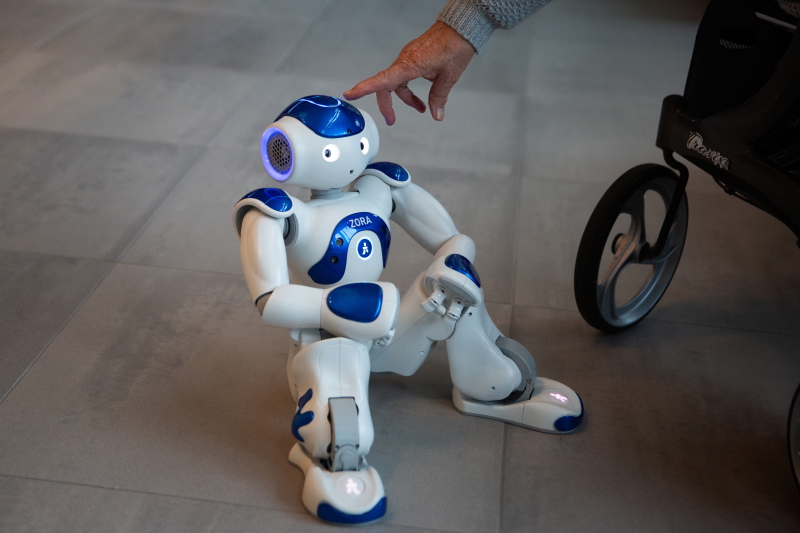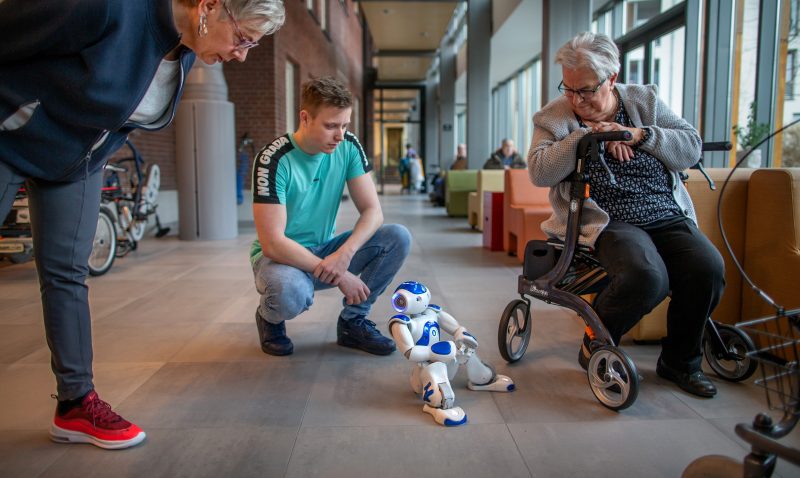Sabine Reinaardus teacher of the Social Work study program wants students of Social Work to become familiar with robots. Student Niek Stegeman took robot Zora with him to a nursing home.
It is an ordinary Wednesday in nursing home Margaretha in Kampen. Niek Stegeman a Social Work student enters the central hall with Zora. He puts the robot down and makes it walk around for a bit. Residents turn around and walk towards it. Niek: ‘After a while, there were a couple of residents who all wanted to meet Zora and asked questions like “Will she be taking care of us later?” and: “What can she do?” Niek explains that Zora can sit down, stand up, walk around, hold your hand and do a little dance. You can even do a quiz with her. Niek decides it is time for a dance: ‘Zora has her own music on her; there are speakers on her head. And she’s quite loud. When she was dancing, more people came to watch her. It’s a shame that the batteries don’t last very long. After about two hours they’re empty. We had to charge Zora – but the story spread and even more people came to see her.
‘Social Work should pay more attention to this’
‘Zora is a so-called ‘care robot’. But a lot of research needs to go into what care she can offer and where it can be applied, says teacher of Social Work Sabine Reinaardus. She met Zora three years ago. ‘I have looked into the possible applications in education, but with Social Work coming up, my horizon broadened and I saw opportunities beyond the study programme. I got in touch with Jolanda van Til who works at Deltion College. She was already working with Zora. She maintained the contacts on the work floor.’

Reinaardus realised that in order to effectively use Zora, she had to look beyond the borders of her own division. ‘I like to create cross-overs, pairing up students from different study programmes. We offer students from the Engineering, Social Work and Laws study programmes a unique chance to collaborate. The Social Work students look at the possibilities of using Zora in certain situations; Engineering students instruct Zora, to make sure she can really be of use and the Laws students look at the privacy matters involved.’ At the moment, Zora is being tested by Dimence Groep Zwolle, also involving the district team Kampen (and nursing home Margaretha). Besides that, the organisation ‘Playing for Success’ is also interested in working with Zora. Reinaardus: ‘That is an organisation which offers kids, who aren’t performing in school as expected because of socially emotional reasons, a fresh opportunity through sports and exercise. Zora is likely to be of help there.’
Along the way, Reinaardus gets a clearer view of what Zora can and can’t do: ‘Zora can stimulate patients to exercise more, she can help in psychoeducation, which means that patients can learn about their ailments, but also in making contact and training social skills. A lot of research needs to be done. But we strive for Zora to be at the disposal of psychologists, teachers, youth counsellors etcetera.’
Not every experiment goes smoothly. Niek Stegeman: ‘We once tested Zora at a primary school, 8th grade. That’s completely different. First of all, you need to be careful that the students don’t handle Zora too roughly. When we did the quiz, we had to instruct the pupils clearly: when you answer, sit directly across Zora, talk clearly and don’t yell all at once. That’s something they find quite difficult.’ Will Zora make it in the field of education? ‘Zora cannot replace the teacher, but she can support them. I think Zora is mostly a means of making contact.’
According to Reinaardus it’s important for students of Social Work to get some experience with regards to the use of robots. ‘Eventually, we want to link education to research. You can imagine a student taking Zora to their internship to work with it. We know that the work floor is very open to these developments and Windesheim can facilitate that.’
However, she must concede that robotics ‘isn’t alive’ within social work circles. ‘I think the study programme should pay a lot more attention to this.’ Together with Jolanda van Til and some others, she held a theme meeting for students, healthcare professionals and teachers at Deltion College on the 28th of January. ‘We hope to get as many teachers enthusiastic about working with different robots as possible.’
Text: Marcel Hulspas
Photos: Herman Engbers
